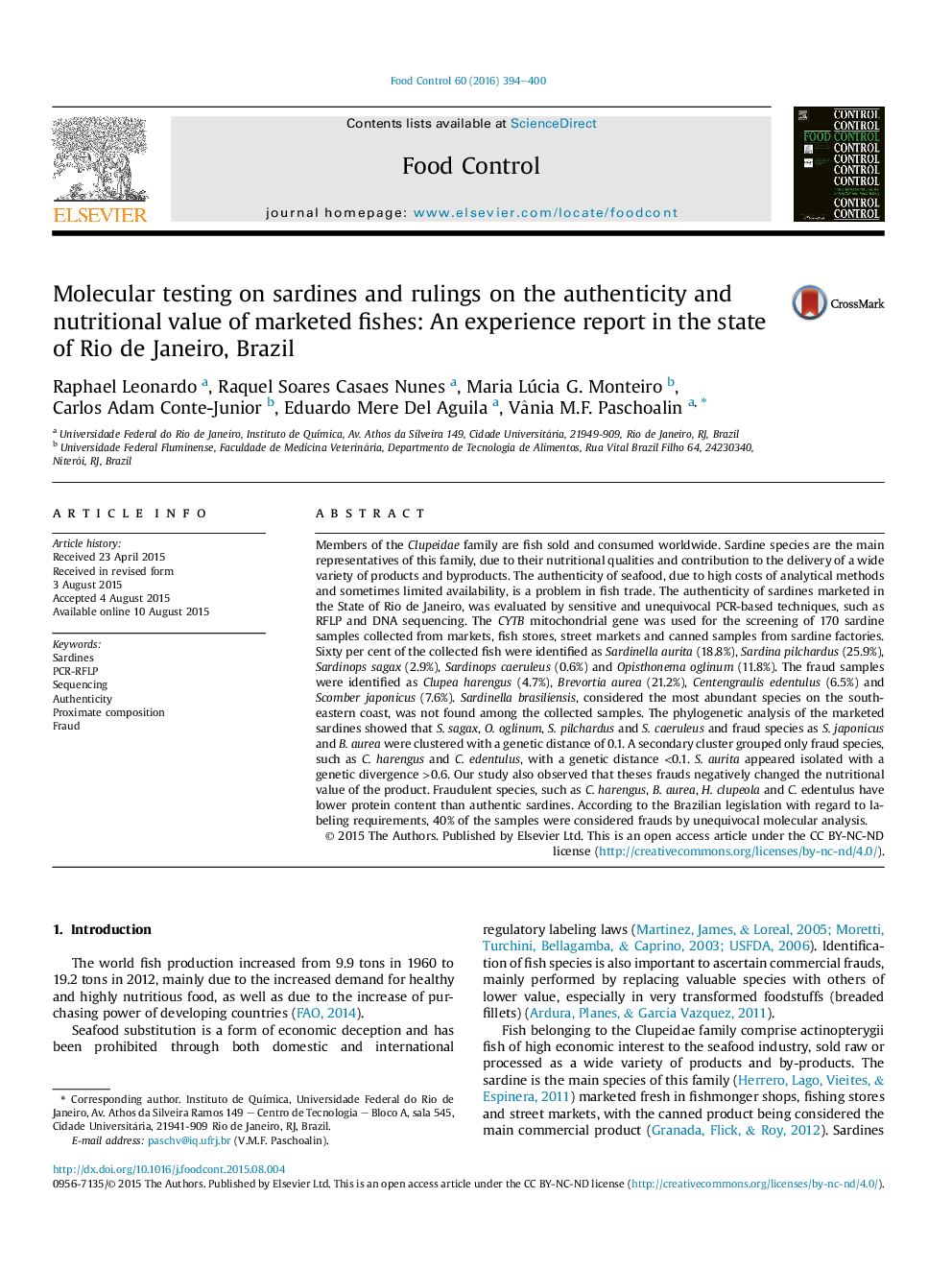| کد مقاله | کد نشریه | سال انتشار | مقاله انگلیسی | نسخه تمام متن |
|---|---|---|---|---|
| 6390302 | 1628402 | 2016 | 7 صفحه PDF | دانلود رایگان |
عنوان انگلیسی مقاله ISI
Molecular testing on sardines and rulings on the authenticity and nutritional value of marketed fishes: An experience report in the state of Rio de Janeiro, Brazil
ترجمه فارسی عنوان
آزمایش مولکولی روی ساردین ها و احکام صادره و ارزش غذایی ماهی های مارچوبه: گزارش تجربی در ایالت ریودوژانیرو، برزیل
دانلود مقاله + سفارش ترجمه
دانلود مقاله ISI انگلیسی
رایگان برای ایرانیان
کلمات کلیدی
موضوعات مرتبط
علوم زیستی و بیوفناوری
علوم کشاورزی و بیولوژیک
دانش تغذیه
چکیده انگلیسی
Members of the Clupeidae family are fish sold and consumed worldwide. Sardine species are the main representatives of this family, due to their nutritional qualities and contribution to the delivery of a wide variety of products and byproducts. The authenticity of seafood, due to high costs of analytical methods and sometimes limited availability, is a problem in fish trade. The authenticity of sardines marketed in the State of Rio de Janeiro, was evaluated by sensitive and unequivocal PCR-based techniques, such as RFLP and DNA sequencing. The CYTB mitochondrial gene was used for the screening of 170 sardine samples collected from markets, fish stores, street markets and canned samples from sardine factories. Sixty per cent of the collected fish were identified as Sardinella aurita (18.8%), Sardina pilchardus (25.9%), Sardinops sagax (2.9%), Sardinops caeruleus (0.6%) and Opisthonema oglinum (11.8%). The fraud samples were identified as Clupea harengus (4.7%), Brevortia aurea (21.2%), Centengraulis edentulus (6.5%) and Scomber japonicus (7.6%). Sardinella brasiliensis, considered the most abundant species on the southeastern coast, was not found among the collected samples. The phylogenetic analysis of the marketed sardines showed that S. sagax, O. oglinum, S. pilchardus and S. caeruleus and fraud species as S. japonicus and B. aurea were clustered with a genetic distance of 0.1. A secondary cluster grouped only fraud species, such as C. harengus and C. edentulus, with a genetic distance <0.1. S. aurita appeared isolated with a genetic divergence >0.6. Our study also observed that theses frauds negatively changed the nutritional value of the product. Fraudulent species, such as C. harengus, B. aurea, H. clupeola and C. edentulus have lower protein content than authentic sardines. According to the Brazilian legislation with regard to labeling requirements, 40% of the samples were considered frauds by unequivocal molecular analysis.
ناشر
Database: Elsevier - ScienceDirect (ساینس دایرکت)
Journal: Food Control - Volume 60, February 2016, Pages 394-400
Journal: Food Control - Volume 60, February 2016, Pages 394-400
نویسندگان
Raphael Leonardo, Raquel Soares Casaes Nunes, Maria Lúcia G. Monteiro, Carlos Adam Conte-Junior, Eduardo Mere Del Aguila, Vânia M.F. Paschoalin,
